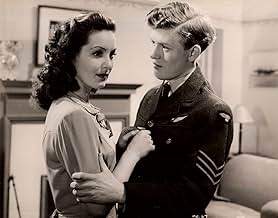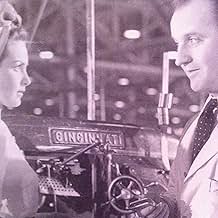Aggiungi una trama nella tua linguaA young woman called into service at a factory during World War II falls in love with a member of the RAF.A young woman called into service at a factory during World War II falls in love with a member of the RAF.A young woman called into service at a factory during World War II falls in love with a member of the RAF.
- Regia
- Sceneggiatura
- Star
- Mrs. Blythe
- (as Amy Vaness)
- Mrs. Hammond
- (non citato nei titoli originali)
- Brenda - Worker at the Factory
- (non citato nei titoli originali)
Recensioni in evidenza
The cast is fine - Patricia Roc and Gordon Jackson headline as Celia and Fred, with Anne Crawford as Jenny and Eric Portman as down-to-earth foreman Charlie. There's also a bit for Radford and Wayne to do (an amusing scene where their travelling soldiers in a railway carriage get overrun with evacuees). Megs Jenkins also plays Gwen with some style and pathos. Patriotic hokum it may be, but I like the foregrounding it gives to the women (especially Jenny, who I quite like by the end of it) and the respect it gives to the factory girls and what they did for their country.
My father recruited workers in Missouri and Oklahoma for an ordinance plant during the war. Most of the workers he recruited--whom he personally put on trains headed north--were women who were happy to leave those depressed areas for higher pay, excitement and contribution to the war effort. Women were glad to go to work in factories, and in 1945 they were happy to give it up for marriage and so returning soldiers could have jobs. That's just the way it was then, and one can't put a different spin on how people behaved.
I hope to see this film again.
This fast paced, light hearted and heartbreaking film about England during WWII starts great and gets better as it goes. The amazing thing, really, is that it was shot during the war and maintains a grim honesty as well as a necessary optimism. Hitler has to be defeated—but the movie makers, and all the actresses in their homespun honesty, did not know he would be.
There are some who label this purely a propaganda war film, and that the gritty lack of romanticizing is part of preparing the populace for the overwhelming nature of the problem. And somehow in an hour and a half you really sense how a country could be turned inside out. The cheerful holiday at the shore that starts the movie turns to families being broken up, women having to work in factories, and eventually news of family members never to return, killed in action.
The American documentary that comes to mind here is "Rosie the Riveter," about the enormous contributions of women in hard core industry (the poster to that shows a woman with a jackhammer). This is a fictional telling of the same idea, and it's far more enjoyable and in fact moving. (The poster for this film just shows a woman's face, with family members in the background—this is about the hearts and souls of the situation.)
I don't think of this as a true "propaganda" film for some simple reasons (all of which make me like the movie more). Foremost, it's not a government sponsored or requested movie—it's not technically in service to some greater force (as propaganda really has to be). It does of course support the home cause, the war against Hitler, and it does so in a way that the audience will pay to see. That's the bottom line here—this is a really compelling romance about real people in a real contemporary world that the audience knows very well. There are countless people to relate to, and details to recognize. The love story aspects are not developed very well, but they are overflowing with sincerity.
Wikipedia mentions that the movie was a "hit" in the USSR, which was also fighting Hitler. And the reason (to me) is simple: it's about regular people, the plight of the working class. There are few pretensions here (if any). And the filming is unusually tightly framed, by which I mean the compositions fill the frame, almost cramping the space on the screen, and it makes for a pleasure to watch, and makes for a lot to look at in every frame. And then the acting itself, without star power, is so straight forward and believable, even the slower moments make you pay attention.
A great film in a vein very very different than, say, "Casablanca" in 1942 (which some people also label as propaganda!). And it came out the same year, and in a way had the same larger context, though beyond that there is nothing in common at all. The point being that this is a terrific film on many levels once you let go of the more polished, and more immediately impressive American films of the same time.
It is also unusual for the era in its unabashed portrayal of young women as actively sexual beings with a healthy, even predatory, interest in men. The sole - and glaring - exception to this model is the central heroine, Celia. Patricia Roc's portrayal of her is so overwhelmingly timid, self-effacing and prudish, it comes as little less than miraculous that she manages to bag Fred: a young Airman in the shape of Gordon Jackson. Mind you, he's no firebrand either: together, they make an infuriatingly ineffectual couple.
Far more interesting is the spiky relationship of social opposites Jennifer (Anne Crawford) - privileged/haughty/indolent - and no-nonsense factory foreman Charlie (Eric Portman). In this pair's uneasy mutual attraction and verbal sparring we see echoes of Shakespeare's Beatrice & Benedick.
N.B.: Watch out for a lovely cameo by Irene Handl as the newlyweds' landlady.
Lo sapevi?
- QuizGrandpa Jim comments that his daughter Phyllis has progressed from dating "local lads" to "the United Nations." Interestingly, although the international organization with that name did not exist until two years after the film's release, the term "United Nations' was used to describe the allied forces arrayed against the Axis Powers. FDR used the term frequently.
- BlooperAlthough Fred Blake (Gordon Jackson) is flight crew on a Short Stirling (the type of aircraft Celia makes parts for and which is seen being towed out of the factory), there are at least two shots of Fred's aircraft taking off/climbing which are actually an Avro Lancaster.
- Citazioni
Charlie: You can't cook or sew, I doubt if you can even knit. You know nothing about life, not what I call life. You're still only a moderate hand on a milling machine and if you had to fend for yourself in the midst of plenty you'd die of starvation. Those are only your bad points. I'm not saying you haven't got any good ones.
Jennifer: You're mighty generous Mr Forbes. As for you, you've no looks, you're old fashioned, morbidly suspicious, dull, and your pipe makes horrible bubbly noises.
- Curiosità sui creditiOpening credits --- over archive footage: NOTE: The orange is a spherical pulpish fruit of reddish-yellow color.
- ConnessioniFeatured in The Unforgettable Gordon Jackson (2012)
- Colonne sonoreSymphony No. 5 in C minor, Op. 67
(uncredited)
Music by Ludwig van Beethoven
Played over main titles and later in the score
I più visti
- How long is Millions Like Us?Powered by Alexa
Dettagli
- Tempo di esecuzione1 ora 43 minuti
- Colore
- Proporzioni
- 1.37 : 1
Contribuisci a questa pagina



































